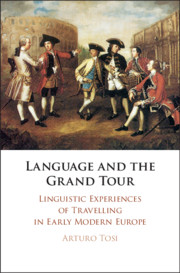Book contents
- Language and the Grand Tour
- Language and the Grand Tour
- Copyright page
- Dedication
- Dedication
- Contents
- Figures
- Preface
- Acknowledgements
- Chronology
- Introduction
- Part I Attitudes and Aptitudes
- Part II Encounters and Exchanges
- Part III Contrasts and Collisions
- 7 Perceptions of Linguistic Diversity
- 8 Instances of Language Contact
- 9 Women Travellers and Gender Issues
- 10 Conclusion
- References
- Index of Names
- Subject Index
9 - Women Travellers and Gender Issues
from Part III - Contrasts and Collisions
Published online by Cambridge University Press: 23 March 2020
- Language and the Grand Tour
- Language and the Grand Tour
- Copyright page
- Dedication
- Dedication
- Contents
- Figures
- Preface
- Acknowledgements
- Chronology
- Introduction
- Part I Attitudes and Aptitudes
- Part II Encounters and Exchanges
- Part III Contrasts and Collisions
- 7 Perceptions of Linguistic Diversity
- 8 Instances of Language Contact
- 9 Women Travellers and Gender Issues
- 10 Conclusion
- References
- Index of Names
- Subject Index
Summary
The intellectual climate of the Enlightenment, with its stress on reason and individualism rather than tradition, was not a minor factor in challenging the customary view of women’s place being in the home. Among the young ladies who expressed frustration about being excluded from wider social circles, there were some who later became famous travellers. Increasingly, the model set by distinguished ladies like Mary Montagu, Hester Piozzi Thrale, Mary Hamilton and Mary Berry of being in charge of one’s own linguistic education at home raised expectations among young ladies of being able to use their foreign languages abroad, which implied freedom to travel. At the twilight of the Grand Tour, women writers aired a variety of fresh interests and inspirations in their new forms of travel narrative. The fact that most British women travellers did not regard Italy as a museum of antiquities but rather as a hospitable land of refuge from domestic oppression and social ostracism, certainly encouraged them to analyse the nature of social relations more objectively. What appeared to male travellers as a manifestation of moral degradation and social awkwardness was seen by women travellers as a different realisation of male and female roles in society.
Keywords
- Type
- Chapter
- Information
- Language and the Grand TourLinguistic Experiences of Travelling in Early Modern Europe, pp. 240 - 259Publisher: Cambridge University PressPrint publication year: 2020
- 1
- Cited by



